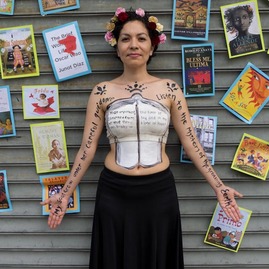(English → Español) View originalTranslators:

Ending Domestic Violence Requires Holding Police Accountable4dgdia77kqifbsc6k742zpl6ra57rxo4
by Evelyn Atkinson and Sandra S. Park, ACLU Women’s Rights Projectm1mjym3eupxoxkl640stxw011d3a8d0f
Are restraining orders just pieces of paper, or must the police take action when they are violated? This is the question raised by Valdez v. City of New York, a case challenging the failure of New York City police to enforce a domestic violence order of protection.egbzzi5h5ql3tmm4em4snqd6kuy26n81
Carmen Valdez obtained an order of protection against her former partner, Felix Perez, after he assaulted, harassed, and stalked her. In July 1996, Felix called Carmen and threatened to kill her – a clear violation of the order. Carmen reported the violation to a police officer familiar with the history of abuse and said that she was on her way to her grandmother’s house because she felt safer there. The officer told her not to worry, that they would arrest Felix, and to go back home. x0zt70ipzw2cbwbps9jt68vf7pawfcaqBelieving that Felix would be arrested immediately, Carmen followed the officer’s instructions – the results of which proved to be tragic.4u51vno1k1zary36o9fwme3kdlxk9i73
The next day, when Carmen opened her apartment door to take out her garbage, Felix shot her repeatedly, with her five-year-old twin sons standing nearby. Carmen sustained serious injuries to her face and arms, requiring multiple surgeries. The police officer had not taken any steps to arrest Felix after Carmen’s call.8y4g94gltrvzhk30s5770b1a9skpqbta
Carmen sued the police department, and a jury found in her favor. But an appellate court overturned the verdict, stating that Carmen was not justified in relying on police.355hhdcjzysje87f2y78ymw9ejykz8mf
Today, the ACLU joined the New York City Bar Association, the New York State Coalition Against Domestic Violence, and other groups in submitting an amicus brief in support of Carmen’s case, urging the New York Court of Appeals to reverse this ruling. In a state where 43 percent of the adult women murdered in 2009 were killed by their intimate partners, victims must have access to a remedy when police fail to respond to domestic violence.m500essmqptdxg9y0z0ugiu4i74dymv3
Unfortunately, Carmen is not the only victim whose reliance on the police resulted in tragedy. The case of Jessica Lenahan (formerly Gonzales) made headlines when Colorado police refused to act after she reported that her estranged husband Simon had kidnapped their three daughters, in violation of a restraining order. She repeatedly pleaded with the police, over a span of ten hours, to rescue the children. At 3:00 a.m. 2xaesblzceqnq79hgvo6pcltcvmpu0chthe next morning, Simon Gonzales drove up to the Castle Rock Police Station and opened fire. The police returned fire, ultimately killing him. The bodies of the three girls, who had been killed, were later found in the cab of Simon’s truck.d5aw9w6nveg7laosddtm4epathnscc2o
Studies show that enforcement of restraining orders plays a critical role in public safety and is cost-effective. Yet, courts have often limited the ability of victims of domestic violence to hold police responsible when they do not carry out their duty to enforce. In 2005, the U.S. Supreme Court held that Jessica Lenahan had no federal constitutional right to enforcement of her restraining order. wv7vcowgxwu6ckotktuc6vuvfro6f346Jessica continues to push the issue, petitioning an international tribunal for a declaration that the government violated her human rights and the human rights of her daughters.asco3wj0z0xdn39yud8zyeom3sws7ed2
Other courts, such as the Illinois Supreme Court and the New York federal courts, have permitted victims to move forward in seeking recourse against the police. And recently, the Department of Justice concluded that the New Orleans Police Department had violated the constitutional rights of victims by treating domestic and sexual violence less seriously than other crimes.m2zp352kboab7ftjqvhn4uniqzskoxov
In Carmen’s case, New York’s highest court should recognize that police must be held accountable when they do not enforce domestic violence laws and increase the danger victims face. Otherwise, our system of protecting victims in New York falls apart.n0avt3lhigotlxy52whr021wj1dr6sfe
(original) View Español translation

Ending Domestic Violence Requires Holding Police Accountable
by Evelyn Atkinson and Sandra S. Park, ACLU Women’s Rights Project
Are restraining orders just pieces of paper, or must the police take action when they are violated? This is the question raised by Valdez v. City of New York, a case challenging the failure of New York City police to enforce a domestic violence order of protection.
Carmen Valdez obtained an order of protection against her former partner, Felix Perez, after he assaulted, harassed, and stalked her. In July 1996, Felix called Carmen and threatened to kill her – a clear violation of the order. Carmen reported the violation to a police officer familiar with the history of abuse and said that she was on her way to her grandmother’s house because she felt safer there. The officer told her not to worry, that they would arrest Felix, and to go back home. Believing that Felix would be arrested immediately, Carmen followed the officer’s instructions – the results of which proved to be tragic.
The next day, when Carmen opened her apartment door to take out her garbage, Felix shot her repeatedly, with her five-year-old twin sons standing nearby. Carmen sustained serious injuries to her face and arms, requiring multiple surgeries. The police officer had not taken any steps to arrest Felix after Carmen’s call.
Carmen sued the police department, and a jury found in her favor. But an appellate court overturned the verdict, stating that Carmen was not justified in relying on police.
Today, the ACLU joined the New York City Bar Association, the New York State Coalition Against Domestic Violence, and other groups in submitting an amicus brief in support of Carmen’s case, urging the New York Court of Appeals to reverse this ruling. In a state where 43 percent of the adult women murdered in 2009 were killed by their intimate partners, victims must have access to a remedy when police fail to respond to domestic violence.
Unfortunately, Carmen is not the only victim whose reliance on the police resulted in tragedy. The case of Jessica Lenahan (formerly Gonzales) made headlines when Colorado police refused to act after she reported that her estranged husband Simon had kidnapped their three daughters, in violation of a restraining order. She repeatedly pleaded with the police, over a span of ten hours, to rescue the children. At 3:00 a.m. the next morning, Simon Gonzales drove up to the Castle Rock Police Station and opened fire. The police returned fire, ultimately killing him. The bodies of the three girls, who had been killed, were later found in the cab of Simon’s truck.
Studies show that enforcement of restraining orders plays a critical role in public safety and is cost-effective. Yet, courts have often limited the ability of victims of domestic violence to hold police responsible when they do not carry out their duty to enforce. In 2005, the U.S. Supreme Court held that Jessica Lenahan had no federal constitutional right to enforcement of her restraining order. Jessica continues to push the issue, petitioning an international tribunal for a declaration that the government violated her human rights and the human rights of her daughters.
Other courts, such as the Illinois Supreme Court and the New York federal courts, have permitted victims to move forward in seeking recourse against the police. And recently, the Department of Justice concluded that the New Orleans Police Department had violated the constitutional rights of victims by treating domestic and sexual violence less seriously than other crimes.
In Carmen’s case, New York’s highest court should recognize that police must be held accountable when they do not enforce domestic violence laws and increase the danger victims face. Otherwise, our system of protecting victims in New York falls apart.
















